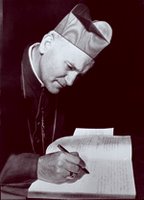Conference: The Phenomenology of John Paul II
 While the positive impact that John Paul II had upon the contemporary world was extensive and will have lasting importance, an often neglected aspect that grounded and inspired his many contributions was his philosophical background.
While the positive impact that John Paul II had upon the contemporary world was extensive and will have lasting importance, an often neglected aspect that grounded and inspired his many contributions was his philosophical background. Influenced by neo-scholastic philosophy and Thomistic theology, he also embraced the merits of phenomenology, writing his second dissertation on the ethical thought of Max Scheler who was a student of Edmund Husserl [This actually is inaccurate, Scheler was not a student of Husserl], the founder of phenomenology. A later philosophical synthesis, The Acting Person, expands upon the focus of his dissertation and shows a deep familiarity with Dutch phenomenological psychologists.
What bearing did phenomenology have upon Karol Wojtyla, the philosopher, and John Paul II, in his role as leader of the teaching church? Paper and Panel Presentations as well as keynote addresses by Avery Cardinal Dulles, S.J., Jean Bethke Elshtain and George Weigel will address this question.
This two-day conference on the phenomenology of John Paul II will be held at Duquesne University on Friday, Dec. 1 and Saturday, Dec. 2, 2006.
John Paul II’s play, The Jeweler’s Shop, will be performed nightly by Duquesne University students. Its exposition of love and commitment is deepened by a phenomenological appreciation of human experience.
The conference is free and open to the public, but seating is limited. The program is available on the website. Registration/reservations are required. For reservations and more information, contact Dr. Daniel Martino, phenomenology@duq.edu or register online.



0 Comments:
Post a Comment
<< Home